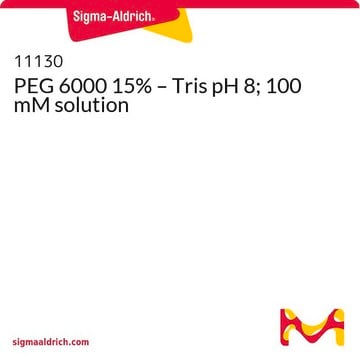81253
Poli(etilenglicol)
BioUltra, for molecular biology, 6,000
Sinónimos:
PEG
About This Item
Productos recomendados
grade
for molecular biology
Quality Level
100
200
product line
BioUltra
form
solid
mol wt
Mr 5000-7000
impurities
DNases, none detected
RNases, none detected
insoluble matter, passes filter test
phosphatases, none detected
proteases, none detected
pH
5.5-7.0 (25 °C, 50 mg/mL in H2O)
solubility
H2O: 50 mg/mL at 20 °C, clear, colorless
anion traces
chloride (Cl-): ≤50 mg/kg
sulfate (SO42-): ≤50 mg/kg
cation traces
Al: ≤5 mg/kg
As: ≤0.1 mg/kg
Ba: ≤5 mg/kg
Bi: ≤5 mg/kg
Ca: ≤10 mg/kg
Cd: ≤5 mg/kg
Co: ≤5 mg/kg
Cr: ≤5 mg/kg
Cu: ≤5 mg/kg
Fe: ≤5 mg/kg
K: ≤200 mg/kg
Li: ≤5 mg/kg
Mg: ≤5 mg/kg
Mn: ≤5 mg/kg
Mo: ≤5 mg/kg
Na: ≤200 mg/kg
Ni: ≤5 mg/kg
Pb: ≤5 mg/kg
Sr: ≤5 mg/kg
Zn: ≤5 mg/kg
λ
50 mg/mL in H2O
UV absorption
λ: 260 nm Amax: 0.15
λ: 280 nm Amax: 0.10
suitability
suitable for (molecular biology applications)
SMILES string
C(CO)O
InChI
1S/C2H6O2/c3-1-2-4/h3-4H,1-2H2
InChI key
LYCAIKOWRPUZTN-UHFFFAOYSA-N
¿Está buscando productos similares? Visita Guía de comparación de productos
General description
Application
Other Notes
Storage Class
11 - Combustible Solids
wgk_germany
WGK 1
flash_point_f
Not applicable
flash_point_c
Not applicable
ppe
Eyeshields, Gloves, type N95 (US)
Certificados de análisis (COA)
Busque Certificados de análisis (COA) introduciendo el número de lote del producto. Los números de lote se encuentran en la etiqueta del producto después de las palabras «Lot» o «Batch»
¿Ya tiene este producto?
Encuentre la documentación para los productos que ha comprado recientemente en la Biblioteca de documentos.
Los clientes también vieron
Contenido relacionado
Polyethylene glycol (PEG), also sometimes referred to as polyethylene oxide (PEO), is a condensation polymer of ethylene oxide and water that has several chemical properties that make it useful for biological, chemical and pharmaceutical applications.
Polyethylene glycol (PEG), also sometimes referred to as polyethylene oxide (PEO), is a condensation polymer of ethylene oxide and water that has several chemical properties that make it useful for biological, chemical and pharmaceutical applications.
Polyethylene glycol (PEG), also sometimes referred to as polyethylene oxide (PEO), is a condensation polymer of ethylene oxide and water that has several chemical properties that make it useful for biological, chemical and pharmaceutical applications.
Polyethylene glycol (PEG), also sometimes referred to as polyethylene oxide (PEO), is a condensation polymer of ethylene oxide and water that has several chemical properties that make it useful for biological, chemical and pharmaceutical applications.
Nuestro equipo de científicos tiene experiencia en todas las áreas de investigación: Ciencias de la vida, Ciencia de los materiales, Síntesis química, Cromatografía, Analítica y muchas otras.
Póngase en contacto con el Servicio técnico


